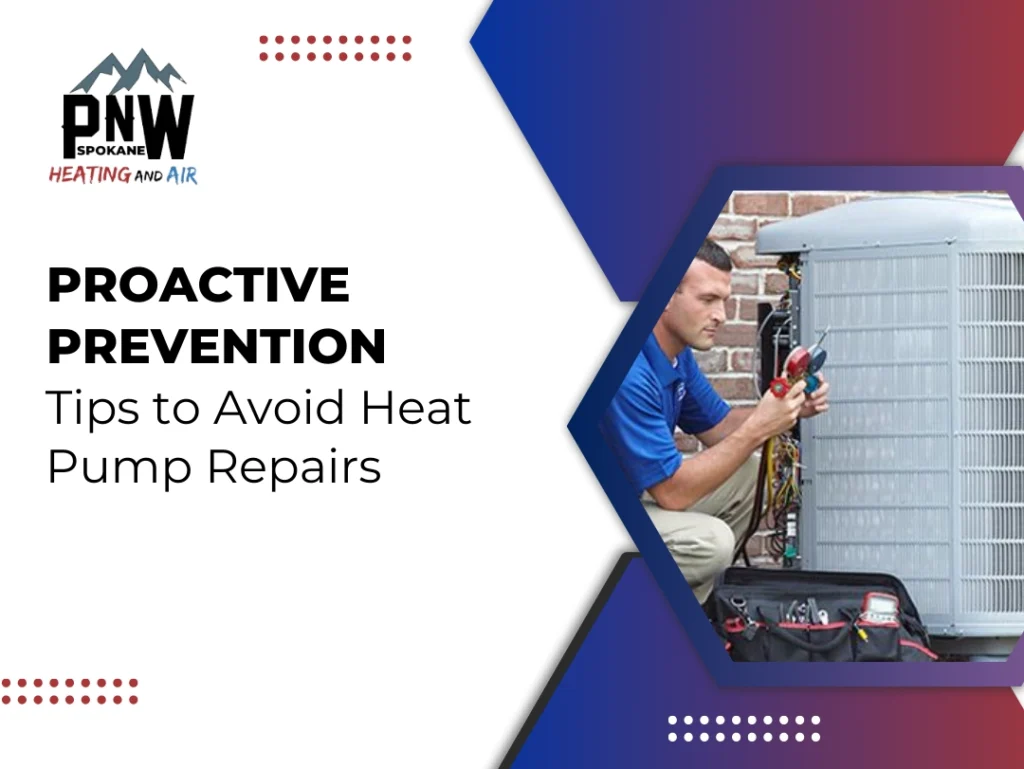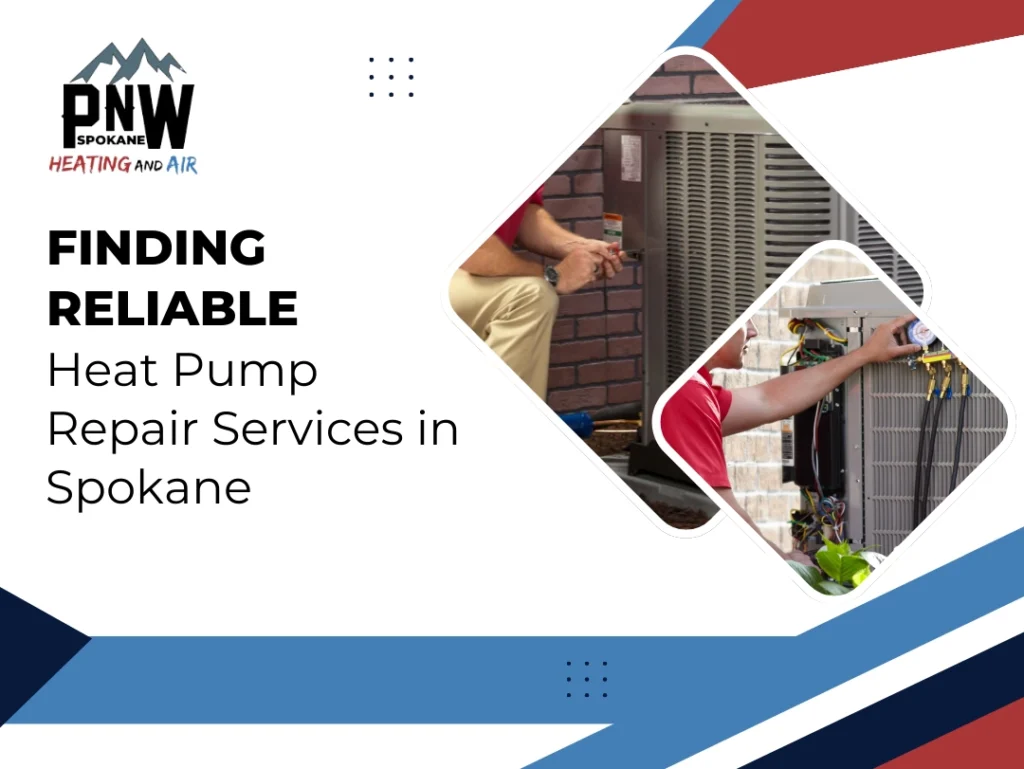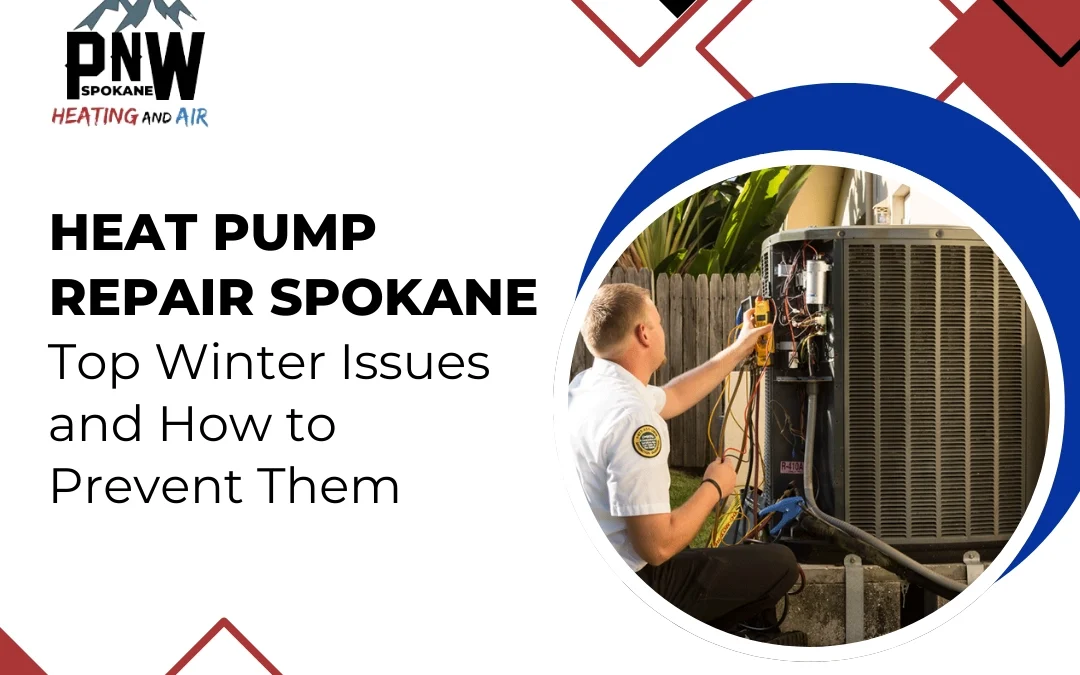Is your heat pump blowing chilly air right when you need warmth the most? For Spokane residents, reliable heating is a must as winter temperatures dip. Yet, winter challenges can push your heat pump to its limits, causing unexpected issues that make your home uncomfortable and your energy bills climb. Knowing the common problems heat pumps face and taking steps to prevent them can make a big difference in staying warm and avoiding costly breakdowns.
In this guide, we’ll look at the typical winter issues heat pumps face, solutions to fix them, and practical prevention tips. By understanding how to handle these situations—and when to call a heating contractor in Spokane—you can keep your system in peak condition and avoid unplanned downtime.
1. How do Heat Pumps Operate in Winter?
Heat pumps operate by transferring heat rather than generating it, making them efficient for both heating and cooling. In winter, they extract warmth from the outside air—even when temperatures are low—and transfer it inside. Here’s a breakdown of how they work during colder months:
- Heat Absorption from Outside: The heat pump’s outdoor unit absorbs thermal energy from the outside air. Surprisingly, even cold air contains some heat, which the pump captures using refrigerant. This refrigerant evaporates and transforms into a gas, carrying heat inside.
- Heat Transfer Indoors: Inside, the refrigerant releases the absorbed heat. The refrigerant gas is compressed, raising its temperature even further. It then moves to the indoor coil, where it condenses and releases the heat into your home.
- Continuous Cycle: The process continues in a cycle, with the refrigerant returning to the outdoor unit to absorb more heat. The system uses less electricity compared to conventional heaters, as it’s not generating heat but moving it.
- Defrost Mode: During extreme cold, frost can form on the outdoor unit. Heat pumps have a defrost mode, briefly reversing the cycle to melt any ice buildup and ensure consistent heating.
- Auxiliary Heating: In very low temperatures, some heat pumps have auxiliary or backup heaters to provide extra warmth. This feature helps maintain a comfortable temperature indoors when outdoor temperatures are extremely cold.
Because they move rather than produce heat, heat pumps are generally more energy-efficient than traditional heaters. However, regular maintenance is key in winter to ensure they perform optimally, especially in colder climates where backup heating may be necessary.
2. Top Winter Issues for Heat Pumps and Repair Solutions
Let’s dive into some of the most common problems Spokane homeowners experience with their heat pumps in winter and simple fixes to keep things running smoothly.
1. Heat Pump Not Turning On
Common Cause: Power Issues or Thermostat Problems
One of the most frustrating issues is when your heat pump won’t turn on at all. This could be a result of an electrical issue, a malfunctioning thermostat, or a tripped circuit breaker. While it’s tempting to try and fix it yourself, it’s important to call a professional heating repair Spokane expert.
How to Prevent It:
- Regularly inspect your thermostat settings. Ensure it is properly set to “heat mode” and the temperature is high enough to activate the system.
- Check the circuit breaker to ensure the unit isn’t disconnected.
- Schedule regular heat pump maintenance to ensure all electrical components are functioning properly.
2. Blowing Cold Air
Common Cause: Low Refrigerant Levels or Frozen Coils
Another common issue during winter is your heat pump blowing cold air. While heat pumps can still pull heat from the air outside, extremely low temperatures can lead to malfunctions. One possible cause is low refrigerant levels, or frozen coils, which can significantly reduce the heat pump’s ability to warm your home.
How to Prevent It:
- Regular maintenance helps to monitor refrigerant levels and ensure they’re topped up as needed.
- Check for frozen coils during extreme cold spells, as this could indicate a defrost issue.
- If the problem persists, it might be time for heat pump repair in Spokane, as an expert heating contractor can inspect the system and resolve refrigerant-related issues.
3. Inefficient Heating
Common Cause: Dirty Filters or Duct Issues
If your heat pump is running, but your home still feels chilly, it could be due to inefficiency. Dirty air filters, blocked ducts, or debris buildup inside the unit can cause poor airflow, making it difficult for your heat pump to heat the space effectively.
How to Prevent It:
- Change or clean the air filters regularly, at least every 1-3 months.
- Ensure no debris around the outdoor unit could block airflow.
- Consider scheduling an annual maintenance check from a Heating contractor Spokane,to ensure everything is clean and running optimally.
4. Strange Noises Coming from the Unit
Common Cause: Loose Parts or Broken Components
If your heat pump starts making loud or strange noises, such as banging, clanging, or scraping, it could be a sign that something is wrong inside the unit. These noises could indicate loose parts, damaged components, or even ice buildup in the system.
How to Prevent It:
- Have a heating contractor in Spokane inspect your heat pump regularly to catch and fix issues before they lead to bigger problems.
- Listen carefully for strange noises and schedule a repair service at the first sign of any unusual sound.
- If ice buildup is the cause, check the defrost function to make sure it’s working properly during cold weather.
5. Frozen Outdoor Unit
Common Cause: Faulty Defrost Cycle or Poor Airflow
A frozen outdoor unit can happen when the heat pump’s defrost cycle fails or the airflow around the unit is blocked. This is especially common in colder climates where ice can quickly build up on the coils, causing the unit to freeze.
How to Prevent It:
- Check your outdoor unit for ice buildup, especially during extended cold spells.
- Ensure the defrost cycle is working properly by scheduling regular maintenance.
- Keep the area around the unit clear of debris to avoid airflow obstructions.
Proactive Prevention Tips to Avoid Heat Pump Repairs

Preventing issues before they occur can save you time, money, and stress. Here are some simple tips to keep your heat pump running smoothly through the winter:
Routine Inspections and Maintenance
Schedule a furnace or heat pump inspection with an HVAC company in Spokane every fall. Technicians can identify potential problems, clean components, and adjust settings to keep your system in top condition before winter arrives.
Keep the Outdoor Unit Clear
Remove any debris, snow, or ice around the outdoor unit. Keep at least two feet of clearance to ensure proper airflow and efficient operation.
Regular Filter Replacement
Clean air filters are crucial to avoid airflow restrictions. Replace filters regularly to maintain efficiency and prevent overheating issues.
Check Thermostat Settings
Avoid frequently changing the thermostat. Set it to a comfortable, consistent temperature to prevent overworking your system.
Seal Ducts and Windows
Leaky ducts and drafts can increase energy use and make your heat pump work harder. Seal any openings and insulate windows to keep warm air inside.
Why Regular Heat Pump Maintenance is Essential for Efficiency?
Preventing these common winter issues starts with regular heat pump maintenance. Annual inspections from a qualified heating contractor in Spokane can help identify minor problems before they turn into costly repairs. During a maintenance check, a professional will clean the filters, check refrigerant levels, inspect the coils, and assess overall system performance. With these proactive steps, you’ll enjoy improved efficiency, fewer breakdowns, and lower energy costs.
Benefits of Regular Heat Pump Maintenance:
- Improved Efficiency: A well-maintained heat pump runs more efficiently, meaning your home stays warm without straining your energy bills.
- Fewer Breakdowns: Regular maintenance can prevent the need for costly emergency heat pump repairs.
- Longer Lifespan: Taking care of your system extends its operational life, saving you from premature HVAC replacement.
- Comfort: Consistent maintenance ensures your heat pump can keep your home comfortable all winter long.
What to Expect from a Professional Inspection
A comprehensive inspection includes:
- Checking and cleaning coils, filters, and fans.
- Ensuring refrigerant levels are adequate.
- Inspecting electrical connections and testing thermostat accuracy. An expert can provide immediate solutions for small issues that could turn into major repairs.
5. Finding Reliable Heat Pump Repair Services in Spokane

A trusted heating contractor in Spokane can be essential when dealing with persistent issues or preventive maintenance. Here are some helpful tips for selecting a trustworthy professional:
Check Credentials and Reviews
Look contractors with great reviews, the right licensing, and relevant experience.. Spokane residents often seek established companies with strong reputations in heating repair Spokane.
Ask Key Questions
Inquire about warranties, pricing transparency, and the scope of services. Don’t hesitate to ask for specific details about maintenance plans or how they approach seasonal checks.
Consider Seasonal Maintenance Plans
Many HVAC companies offer maintenance packages that include seasonal inspections, tune-ups, and priority repairs. These plans provide peace of mind and often come at discounted rates, helping you avoid unexpected expenses.
Conclusion
Winter heat pump issues can be frustrating, but understanding the most common problems and how to address them can keep your home warm and comfortable all season. By staying on top of regular maintenance and making quick repairs when needed, you can keep your system running smoothly and reliably.
If you’re facing issues with your heat pump or want to prepare for winter, scheduling a heat pump repair in Spokane with a qualified technician is a smart move. Proactive care can keep your home comfortable, reduce energy costs, and give you peace of mind as temperatures drop.

